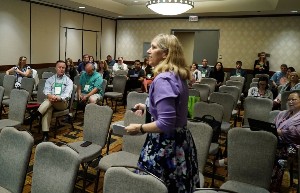 by Tina Falkner, AACRAO President; Director, Office of Student Finance, University of Minnesota
by Tina Falkner, AACRAO President; Director, Office of Student Finance, University of Minnesota
Dr. Helen B. Garrett, University Registrar and Chief Officer of Enrollment Information Services at the University of Washington, willingly and deftly guided a discussion about the role of the registrar in Title IX-related matters. On face value we, in the registrar business, seem very much on the periphery of Title IX matters but Helen helped attendees leave the session thinking a bit differently.
Those of us not well-versed in Title IX matters often think of athletics and sexual harassment/assault when the question is posed about what is covered under Title IX; surprisingly, it also covers parenting and pregnancy, LGBTQ issues, and STEM (Science, Technology, Engineering and Math) field delivery. I think most attendees had never thought about Title IX protections extending to these areas too.
Our work, especially with academic petitions, SAP (Satisfactory Academic Progress) appeals, and retroactive withdrawal requests can present potential Title IX covered matters since students may reveal incidents of sexual harassment or assault or other matters covered under Title IX in their associated narratives. If these issues are disclosed we cannot, and should not as caring human beings, just ignore them. We have an obligation to inform the student of our Title IX responsibilities, provide them with resources to help them navigate the topic, and provide appropriate assistance.
Dr. Garrett assured attendees that providing support and assistance to students in potential Title IX issues is challenging for myriad reasons and not being sure exactly what to do is not uncommon. She encouraged all to become familiar with our campus resources, to engage our colleagues in identifying potential areas of concern and how to bring concerns forward, and to work closely with campus Title IX coordinators to establish protocols and responses.
She also encouraged attendees to think about creating a data hub where students seeking to make changes to their academic history, to ask for tuition to be refunded, and to respond to financial aid satisfactory academic progress notices can upload these documents once and institutional staff can retrieve what they need. Students sharing sensitive issues related to sexual misconduct can be retriggered when having to repeatedly submitting documentation of this or retelling their stories. It is also important to adopt a process by which a statement of support from an institutional official for grade renewal is enough without having to have the student or documenter recount the sensitive details of the event covered by Title IX. Especially since these documents must be retained for seven years and with the failure by most institutions to purge their online records after the required archive time period potentially even longer.
She also noted that her campus, the University of Washington, had some phenomenal Title IX training resources that attendees could adapt for their campuses.
Find those resources here.